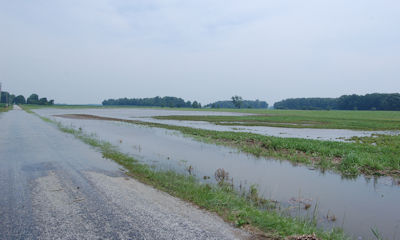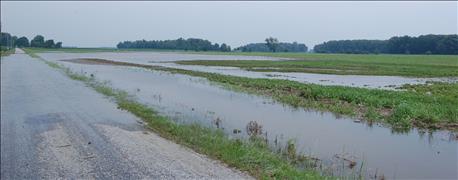
The bridge problem that closed Interstate 65 north of Lafayette for several weeks last summer guaranteed this legislative session would be about roads in a big way. Both parties in the political arena jumped on it, and it was obvious that although this is not a budget year, road funding would be front and center.
From the vantage point of halfway through the session, the legislators haven’t disappointed those who wanted road issues and funding for improving infrastructure addressed. In fact there are so many bills still moving that the outcome is shrouded in fog, much like trying to drive on a foggy February morning.

REPAIR ROADS: Too much rain, too much freeze and thawing and too much weight on loads all take their toll on rural roads. Bills moving in the legislature could free up money for local road repairs.
Katrina Hall, chief lobbyist for Indiana Farm Bureau, believes the picture will soon clear up. She is optimistic that the outcome will be good for rural counties, and provide opportunities to update infrastructure.
Here’s an interview with Hall, just past the halfway point of the session.
IPF: What is happening concerning roads and funding for roads in the legislature so far?
Hall: There are a number of bills that are moving and still alive. Some reach the goal of providing more funding for roads in very different ways. We’re watching to see how things develop.
What are some of the possibilities people might expect?
Hall: Senate Bill 67 would allow counties with local option income taxes to have access to funds by lowering the percentage counties are required to keep in reserve balance in the fund. Currently, they must keep 50% as a balance. There is talk about dropping it to 15% or 25%.
What it would do is provide a one-time shot of money that counties could choose to use on roads and bridges if they want. Our view is that there is probably no reason to keep 50% back as a balance. This would provide funding now, and might mean they have some more money in future years, since they don’t have to build the balance back as high.
Would the money freed up be earmarked just for roads?
Hall: There are different versions of this concept out there in various bills. Some earmark it for roads, and some don’t specify how it must be used. One says 75% of it must be spent on roads.
Wouldn’t this free up more money in some counties than others?
Hall: Yes. It depends how much counties have in their local option income tax fund. What a concept like this would do is reward counties which haven’t depended as much on property taxes.
What other concepts are out there?
Hall: The bill that is a priority for the majority caucus in the House is House Bill 1001. It contains many parts. In simplest terms it would give counties the option of redirection some of the income tax money to be used on roads. The state would make up the difference in the state budget by raising the excise tax on cigarettes by $1 per pack.
How does the future look for this bill?
Hall: It is still too early to say. It includes language about raising gasoline taxes, and the Governor has said he wouldn’t raise taxes. But it also was amended at the last minute to include a 5% cut in state income taxes, which would help Governor Pence keep the promise he made when he took office.
It’s difficult to tell how this package might be received in the Senate.
Are all bills related to roads moving forward?
Hall: There was a bill to establish an advisory committee that would work with INDOT. House Bill 1112 ran into some opposition. It has been changed to proposing a study committee to address the issue before the next session.
About the Author(s)
You May Also Like




